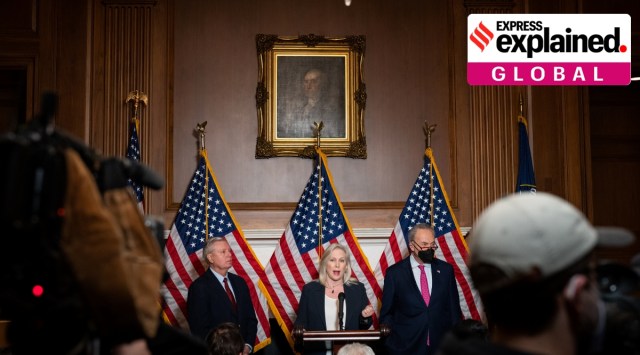The US Congress on Thursday passed a legislation that ends forced arbitration in sexual assault and harassment disputes at workplaces. The Bill, if signed by President Joe Biden, will allow survivors to sue their abusers in a public court even if they have signed employment agreements that require them to settle disputes internally through an arbitrator.
Introduced in Congress by Senator Kirsten Gillibrand in 2017, following an explosive #MeToo case at Fox News, the Ending Forced Arbitration of Sexual Assault and Sexual Harassment Act will also have a retroactive effect. In a press release on Thursday, Gillibrand called it “one of the most significant workplace reforms in the last 50 years” and “a major step forward toward changing a system that uses secrecy to protect perpetrators and silence survivors”.

What is forced arbitration?
Often employee contracts contain arbitration provisions that limit what they are allowed to say in public about workplace disputes such as those pertaining to sexual harassment or racial discrimination. It allows companies to settle disputes through an arbitrator – an independent body, usually comprising lawyers or retired judges – behind closed doors, instead of allowing its employees to pursue legal action publicly.
The Bill nulls both predispute arbitration agreement and predispute joint-action waiver (which may or may not be part of the arbitration agreement).
Story continues below this ad
It defines predispute arbitration agreement as “any agreement to arbitrate a dispute that had not yet arisen at the time of the making of the agreement” and predispute joint-action waiver as an agreement that prohibits or waives the right of the employee to “take part in a joint, class, or collective action in a judicial, arbitral, administrative, or other forum, concerning a dispute”.

In 2017, the Economic Policy Institute had estimated that roughly 60.1 million American workers were subject to mandatory arbitration at their places of employment. Arbitration clauses have often been criticised for favouring employers over workers as well as hindering survivors in seeking justice.
How did a #MeToo case at Fox News highlight forced arbitration?
Former Fox News anchor Gretchen Carlson’s allegations of sexual harassment at her workplace led to the downfall of Roger Ailes, the CEO of Fox News, who was considered as a ‘kingmaker’ in the industry. Her case also shed light on the practice of forced arbitration.
Story continues below this ad
Carlson over the years recorded proof of Ailes’ sexual harassment, which constituted inappropriate remarks as well as an overtly sexual proposition. However, she learnt that a mandatory arbitration clause in her contract prevented her from suing Fox News for workplace harassment. So, in 2016, she instead decided to sue Ailes personally, who on his part denied the allegations. Her lawsuit and the media’s coverage of the case prompted at least 20 other women at the time to speak up against Ailes. After much internal debate among the Murdochs – the family behind the Fox empire – Ailes was banned from the media house with a non-compete clause, preventing him from going to a rival channel.
While Carlson was awarded a $20 million settlement, the case also brought forth cases of other women like Laurie Luhn, who was reportedly paid $3.15 million in 2011 for settling a sexual harassment case against Ailes. However, the secrecy of the settlement had shielded Ailes from any public accountability.
Carlson then joined Senator Gillibrand and others in introducing a law against mandatory arbitration. On Thursday, after the Bill was passed in the Senate she said, “Every survivor deserves the right to tell their story, and once this change is enshrined in law, it will give those who experienced assault or harassment in the workplace the right to choose how they seek justice. It will also prevent assault and harassment in the first place, making it known to any would-be predator that their abuse can subject them to litigation and that survivors will have the right to speak out”.
Companies like Google, Facebook ended forced arbitration
Story continues below this ad
After Gillibrand introduced the Bill in 2017, tech giant Microsoft announced that it will no longer require employees to settle sexual harassment cases in secrecy, becoming one of the first major companies to eliminate mandatory arbitration.
In 2018, Google and Facebook rolled back the clause, following protests by Google employees. Earlier that year, Uber too had scrapped the clause in part. While sexual harassment cases would no longer be resolved privately, the financial aspects of the case would not be disclosed in public.
What’s next?
The House passed its own version of the Bill by an overwhelming majority of 335 to 97 on February 7. The Senate on Thursday passed it through a voice vote, seeing broad support from both Democrats and Republicans. The Bill now awaits the President’s signature to become a law.
The White House in a statement on February 1 indicated Biden’s approval for the legislation. “The Administration supports House passage of H.R. 4445, the Ending Forced Arbitration of Sexual Assault and Sexual Harassment Act of 2021,” the statement read. It noted, “More than 60 million Americans are subject to mandatory arbitration clauses in the workplace, often without realizing it until they come forward to bring a claim against their employer.”
Story continues below this ad
India’s law against sexual harassment at the workplace
While the Sexual Harassment of Women at Workplace Act 2013 does not have provisions for arbitration, similar criticisms have been made against the “internal committees” instituted by the Act to address grievances. The Justice Verma Committee in its 2013 report had found constituting in-house committees “counter-productive” as it may discourage victims from filing sexual harassment complaints. It had instead recommended forming an employment tribunal.
The committee in its report had recommended deleting Section 10 of the Act, which allows for ‘conciliation’ if requested by the survivor to settle the dispute with the respondent before the internal committee launches an inquiry. No monetary settlement must be reached through conciliation, the act states. However, the report noted, “…we think that the attempts to get justice cannot be muscled by attempts at conciliation”. In 2019, the National Commission for Women made a similar suggestion, stating that the provision may force women to withdraw a case to safeguard the honour of the workplace.
Besides, an IndiaSpend investigation in 2021 noted that despite the law the workers in the informal sector, which employs 95% of women, find it hard to access legal mechanisms to report sexual harassment.
Newsletter | Click to get the day’s best explainers in your inbox









































